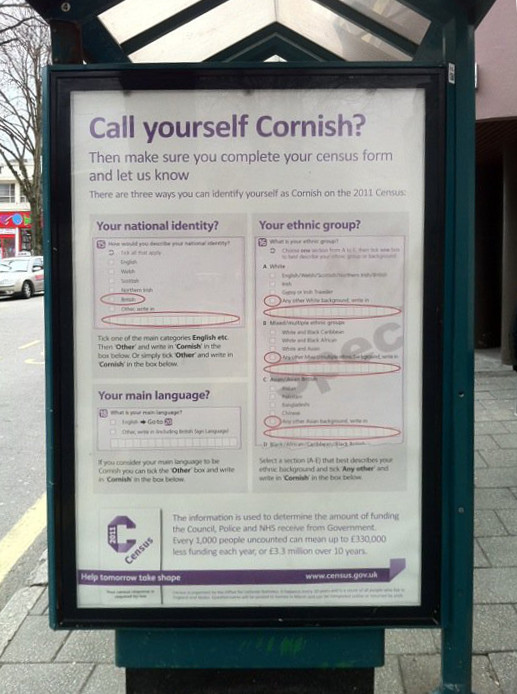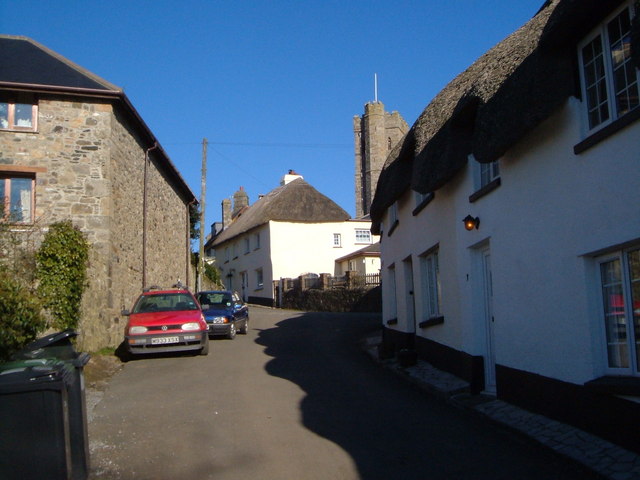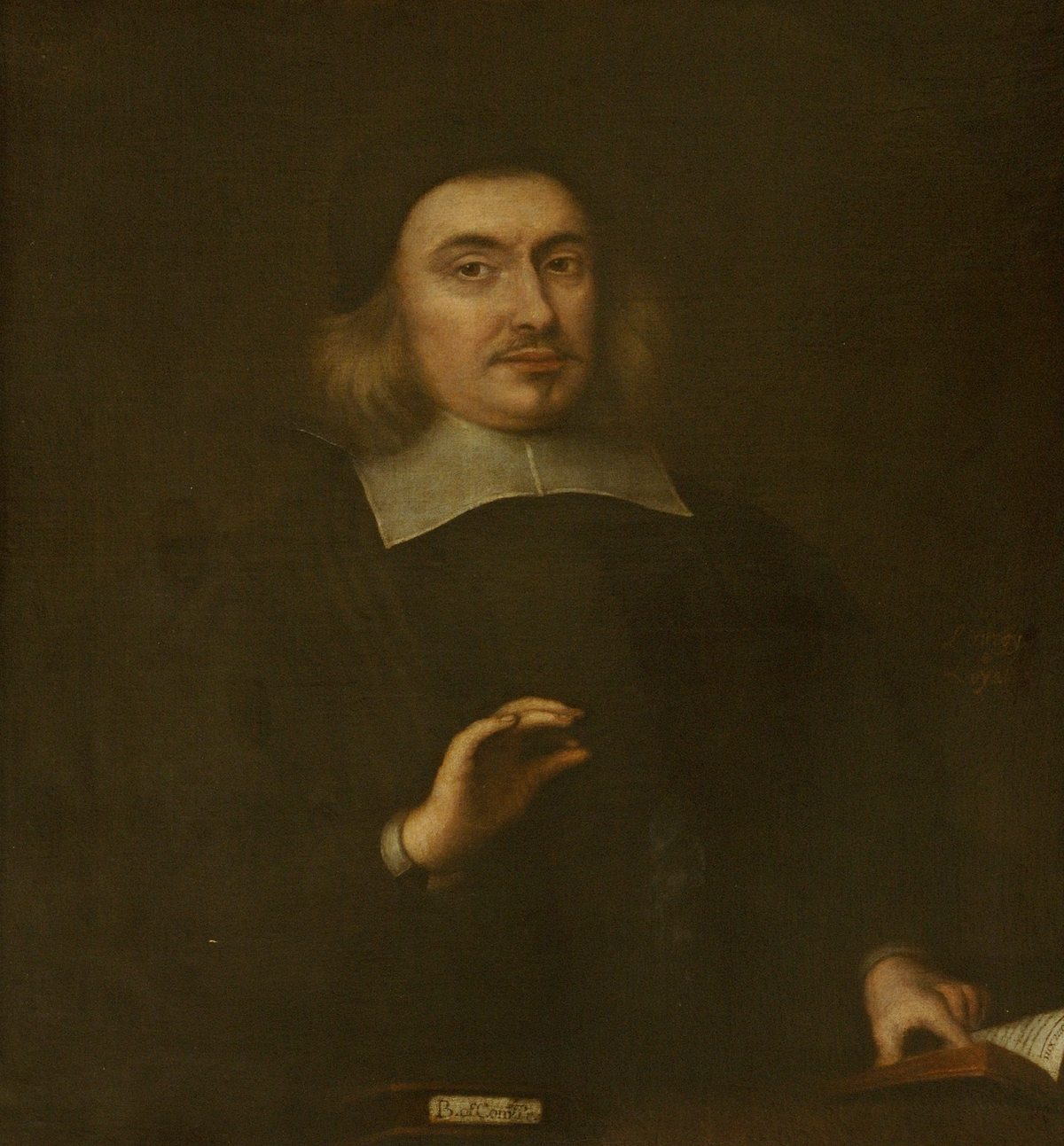|
William Paynter (academic)
Rev. William Paynter D.D. (1637 – 18 February 1716) was an English clergyman and Vice-Chancellor of Oxford University. The son of William Paynter or Cambourne, from Antron in Sithney, and Jane, the sixth child of Richard Keigwin of Mousehole, he was born at Trelissick Manor in the parish of St Erth, Cornwall, England, and baptised on 7 December 1637. Having been admitted as a poor scholar in February 1656, he matriculated from Exeter College, Oxford, on 29 March that year, and on 3 July 1657 he was elected to a fellowship of the college. He graduated B.A. in 1660 and M.A. in 1663 (incorporated at Cambridge in 1664), B.D. in 1674, and D.D. in 1695. In 1669, together with those of several other Cornishmen, Paynter's fellowship was suspended by Arthur Bury, the college rector and a devout Devonian, on the grounds that Paynter had been elected to one of the fellowships earmarked for candidates from Devon. In spite of this rebuff, in 1685 Paynter gave £100 to Exeter College. The ... [...More Info...] [...Related Items...] OR: [Wikipedia] [Google] [Baidu] |
England
England is a country that is part of the United Kingdom. It shares land borders with Wales to its west and Scotland to its north. The Irish Sea lies northwest and the Celtic Sea to the southwest. It is separated from continental Europe by the North Sea to the east and the English Channel to the south. The country covers five-eighths of the island of Great Britain, which lies in the North Atlantic, and includes over 100 smaller islands, such as the Isles of Scilly and the Isle of Wight. The area now called England was first inhabited by modern humans during the Upper Paleolithic period, but takes its name from the Angles, a Germanic tribe deriving its name from the Anglia peninsula, who settled during the 5th and 6th centuries. England became a unified state in the 10th century and has had a significant cultural and legal impact on the wider world since the Age of Discovery, which began during the 15th century. The English language, the Anglican Church, and Engli ... [...More Info...] [...Related Items...] OR: [Wikipedia] [Google] [Baidu] |
Cornish People
The Cornish people or Cornish ( kw, Kernowyon, ang, Cornƿīelisċ) are an ethnic group native to, or associated with Cornwall: and a recognised national minority in the United Kingdom, which can trace its roots to the ancient Britons who inhabited southern and central Great Britain before the Roman conquest. Many in Cornwall today continue to assert a distinct identity separate from or in addition to English or British identities. Cornish identity has been adopted by migrants into Cornwall, as well as by emigrant and descendant communities from Cornwall, the latter sometimes referred to as the Cornish diaspora. Although not included as an tick-box option in the UK census, the numbers of those writing in a Cornish ethnic and national identity are officially recognised and recorded. Throughout classical antiquity, the ancient Britons formed a series of tribes, cultures and identities in Great Britain; the Dumnonii and Cornovii were the Celtic tribes who inhabited what w ... [...More Info...] [...Related Items...] OR: [Wikipedia] [Google] [Baidu] |
Matthew Hole
{{disambiguation ...
Matthew may refer to: * Matthew (given name) * Matthew (surname) * ''Matthew'' (ship), the replica of the ship sailed by John Cabot in 1497 * ''Matthew'' (album), a 2000 album by rapper Kool Keith * Matthew (elm cultivar), a cultivar of the Chinese Elm ''Ulmus parvifolia'' Christianity * Matthew the Apostle, one of the apostles of Jesus * Gospel of Matthew, a book of the Bible See also * Matt (given name), the diminutive form of Matthew * Mathew, alternative spelling of Matthew * Matthews (other) * Matthew effect * Tropical Storm Matthew (other) The name Matthew was used for three tropical cyclones in the Atlantic Ocean, replacing Mitch after 1998. * Tropical Storm Matthew (2004) - Brought heavy rain to the Gulf Coast of Louisiana, causing light damage but no deaths. * Tropical Storm Matt ... [...More Info...] [...Related Items...] OR: [Wikipedia] [Google] [Baidu] |
Dictionary Of National Biography
The ''Dictionary of National Biography'' (''DNB'') is a standard work of reference on notable figures from British history, published since 1885. The updated ''Oxford Dictionary of National Biography'' (''ODNB'') was published on 23 September 2004 in 60 volumes and online, with 50,113 biographical articles covering 54,922 lives. First series Hoping to emulate national biographical collections published elsewhere in Europe, such as the ''Allgemeine Deutsche Biographie'' (1875), in 1882 the publisher George Smith (1824–1901), of Smith, Elder & Co., planned a universal dictionary that would include biographical entries on individuals from world history. He approached Leslie Stephen, then editor of the ''Cornhill Magazine'', owned by Smith, to become the editor. Stephen persuaded Smith that the work should focus only on subjects from the United Kingdom and its present and former colonies. An early working title was the ''Biographia Britannica'', the name of an earlier eighteen ... [...More Info...] [...Related Items...] OR: [Wikipedia] [Google] [Baidu] |
Ilsington
Ilsington is a village and civil parish situated on the eastern edge of Dartmoor, Devon, England. It is one of the largest parishes in the county, and includes the villages of Ilsington, Haytor Vale, Liverton and South Knighton. The parish is surrounded, clockwise from the north, by the parishes of Bovey Tracey, Teigngrace (a short border only), Newton Abbot, Ogwell (another short border), Bickington, Ashburton, Widecombe-in-the-Moor and Manaton. In 2001 the population of the parish was 2,444, greatly increased from the 886 residents recorded in 1901. The parish is represented in parliament by Mel Stride, as part of the Central Devon constituency. History The village is believed to be an ancient settlement – probably existing 200 to 300 years before the Norman Conquest. It is mentioned in the Domesday Book of 1086 as Ilestintona, and there is known to have been a church there since at least the 11th century. St. Michael's parish church, as seen today, dates back to the 15th ... [...More Info...] [...Related Items...] OR: [Wikipedia] [Google] [Baidu] |
House Of Lords
The House of Lords, also known as the House of Peers, is the Bicameralism, upper house of the Parliament of the United Kingdom. Membership is by Life peer, appointment, Hereditary peer, heredity or Lords Spiritual, official function. Like the House of Commons of the United Kingdom, House of Commons, it meets in the Palace of Westminster in London, England. The House of Lords scrutinises Bill (law), bills that have been approved by the House of Commons. It regularly reviews and amends bills from the Commons. While it is unable to prevent bills passing into law, except in certain limited circumstances, it can delay bills and force the Commons to reconsider their decisions. In this capacity, the House of Lords acts as a check on the more powerful House of Commons that is independent of the electoral process. While members of the Lords may also take on roles as government ministers, high-ranking officials such as cabinet ministers are usually drawn from the Commons. The House of Lo ... [...More Info...] [...Related Items...] OR: [Wikipedia] [Google] [Baidu] |
Court Of King's Bench (England)
The Court of King's Bench, formally known as The Court of the King Before the King Himself, was a court of common law in the English legal system. Created in the late 12th to early 13th century from the '' curia regis'', the King's Bench initially followed the monarch on his travels. The King's Bench finally joined the Court of Common Pleas and Exchequer of Pleas in Westminster Hall in 1318, making its last travels in 1421. The King's Bench was merged into the High Court of Justice by the Supreme Court of Judicature Act 1873, after which point the King's Bench was a division within the High Court. The King's Bench was staffed by one Chief Justice (now the Lord Chief Justice of England and Wales) and usually three Puisne Justices. In the 15th and 16th centuries, the King's Bench's jurisdiction and caseload was significantly challenged by the rise of the Court of Chancery and equitable doctrines as one of the two principal common law courts along with the Common Pleas. To recov ... [...More Info...] [...Related Items...] OR: [Wikipedia] [Google] [Baidu] |
Rector (academia)
A rector (Latin for 'ruler') is a senior official in an educational institution, and can refer to an official in either a university or a secondary school. Outside the English-speaking world the rector is often the most senior official in a university, whilst in the United States the most senior official is often referred to as president and in the United Kingdom and Commonwealth of Nations the most senior official is the chancellor, whose office is primarily ceremonial and titular. The term and office of a rector can be referred to as a rectorate. The title is used widely in universities in EuropeEuropean nations where the word ''rector'' or a cognate thereof (''rektor'', ''recteur'', etc.) is used in referring to university administrators include Albania, Austria, the Benelux, Bosnia and Herzegovina, Bulgaria, Croatia, Cyprus, Czech Republic, Denmark, Estonia, Finland, Germany, Greece, Hungary, Iceland, Italy, Latvia, Malta, Moldova, North Macedonia, Poland, Portugal, Romani ... [...More Info...] [...Related Items...] OR: [Wikipedia] [Google] [Baidu] |
Broughton, Milton Keynes
Broughton (, ) is a historic village, modern district and civil parish in Milton Keynes, Buckinghamshire, England. , it is governed by Broughton and Milton Keynes Joint Parish Council, which it shares with the neighboring Milton Keynes parish. Today, Broughton is a large district of (greater) Milton Keynes that has been developed around the original village and that grew substantially during the 2000s and 2010s. History and location The name is Old English and meant 'brook farm'. In the Domesday Book, it is listed as owned by a Walter Giffard and the tenant was a Hugh de Bolbec. In the 6th century, its name was spelt ''Brotone''. The original Northampton to London turnpike came through the village (to join Watling Street A5 road] near Woburn, Bedfordshire, Woburn). The Milton Keynes grid road system, Milton Keynes grid road, Child's Way (H6), forms the district's northern boundary while Tongwell Street (V11) provides its western, and the M1 motorway provides its eastern (wh ... [...More Info...] [...Related Items...] OR: [Wikipedia] [Google] [Baidu] |
Edward Reynolds (bishop)
Edward Reynolds (November 1599 – 28 July 1676) was a bishop of Norwich in the Church of England and an author.Cyclopaedia of Biblical, Theological, and Ecclesiastical Literature. Prepared by the Rev. John M'Clintock, D.D., and James Strong, S.T.D. 1891. Vol. VIII:1078. He was born in Holyrood parish in Southampton, the son of Augustine (Austin) Reynolds, one of the customers of the city, and his wife, Bridget. Career In 1615, Reynolds became postmaster of Merton College and in 1620, probationer fellow. In 1622 he was appointed Preacher at Lincoln's Inn (where he is memorialised by his arms sculpted on a corbel supporting the roof of a Hall) from 1627 to 1628 served as the thirty-seventh vicar of All Saints' Church, Northampton, and in 1631 rector of Braunston, also in Northamptonshire; but with the outbreak of the English Civil War in 1642, he sided with the Presbyterians. In 1643 he was one of the Westminster Assembly divines, and took the covenant in 1644. In 1648 he bec ... [...More Info...] [...Related Items...] OR: [Wikipedia] [Google] [Baidu] |
Interregnum
An interregnum (plural interregna or interregnums) is a period of discontinuity or "gap" in a government, organization, or social order. Archetypally, it was the period of time between the reign of one monarch and the next (coming from Latin ''inter-'', "between" and ''rēgnum'', "reign" rom ''rex, rēgis'', "king", and the concepts of interregnum and regency therefore overlap. Historically, longer and heavier interregna have been typically accompanied by widespread unrest, civil and succession wars between warlords, and power vacuums filled by foreign invasions or the emergence of a new power. A failed state is usually in interregnum. The term also refers to the periods between the election of a new parliament and the establishment of a new government from that parliament in parliamentary democracies, usually ones that employ some form of proportional representation that allows small parties to elect significant numbers, requiring time for negotiations to form a government. ... [...More Info...] [...Related Items...] OR: [Wikipedia] [Google] [Baidu] |
John Conant
Rev. John Conant D.D. (18 October 1608 – 12 March 1694) was an English clergyman, theologian, and Vice-Chancellor of Oxford University. Life Conant was born at Yettington, Bicton, in the southeast of Devon, England, the eldest son of Robert Conant, son of Richard Conant and his wife, Elizabeth Morris. He was educated first in the free school at Ilchester, Somerset, and then under the instruction of the schoolmaster Thomas Branker, with additional instruction by his uncle John, rector of Limington in Somerset. Taken by his uncle to Oxford in 1627, he was enrolled on 18 February as a commoner of Exeter College, Oxford. There he was tutored by Lawrence Bodley, nephew of the benefactor of the Bodleian Library at Oxford. Conant quickly gained a mastery of Greek, debating publicly in that language, and also excelled in Hebrew, Syriac, and Arabic. His potential was recognised by John Prideaux, the anti-Arminian rector of Exeter, who commented that he found nothing difficult. Jo ... [...More Info...] [...Related Items...] OR: [Wikipedia] [Google] [Baidu] |





.jpg)
